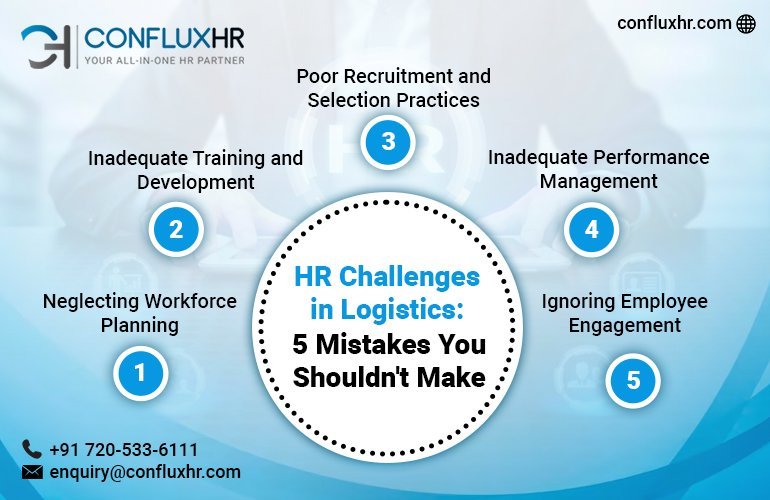In the fast-paced world of logistics, effective human resources management is crucial for success. However, many logistics businesses unknowingly make common HR mistakes that can hinder productivity, employee engagement, and overall performance. In this blog, we will highlight the top 5 HR challenges in logistics and explore how HRM solutions like ConfluxHR can help businesses rectify these honest mistakes and optimize their HR practices.
Neglecting Workforce Planning and Talent Acquisition
One of the most significant mistakes logistics businesses make is neglecting strategic workforce planning and talent acquisition. Failure to anticipate future staffing needs or identify skill gaps can result in a shortage of qualified employees.
HRM solutions like ConfluxHR offer robust workforce planning features that help businesses identify talent requirements, plan for succession, and streamline the recruitment process.
Inadequate Training and Development Programs
Another common mistake is providing inadequate training and development programs. In a dynamic industry like logistics, employee upskilling is vital for performance improvement and career growth.
In addition, HRM solutions like ConfluxHR provide comprehensive training management tools, enabling businesses to design and deliver targeted training programs that enhance employee skills and contribute to their professional development.
Lack of Employee Engagement and Recognition
Failing to prioritize employee engagement and recognition can lead to disengaged and dissatisfied employees. Logistics businesses often overlook the importance of regular communication, team-building activities, and employee recognition programs.
HRM solutions like ConfluxHR offer engagement modules that facilitate effective communication, foster a positive work environment, and enable managers to recognize and reward employee contributions.
Non-compliance with Employment Regulations
Compliance with employment regulations is crucial to avoid legal repercussions and protect the organization’s reputation. Many logistics businesses struggle to keep up with evolving labor laws and safety regulations.
HRM solutions like ConfluxHR come with built-in compliance features that automate regulatory requirements, ensuring businesses stay up-to-date and mitigate compliance risks.
Inefficient HR Systems and Processes
Relying on outdated and inefficient HR systems and processes can lead to administrative bottlenecks, errors in data management, and inefficient workflows.
Further, logistics businesses need a modern HRM solution like ConfluxHR that offers streamlined processes, automated workflows, and accurate data management.
By leveraging ConfluxHR’s intuitive interface and advanced features, businesses can optimize HR operations, reduce manual errors, and save valuable time.
Conclusion
By recognizing and rectifying these 5 HR Challenges, logistics businesses can build a solid foundation for HR management success. HRM solutions like ConfluxHR play a pivotal role in addressing these challenges.
With its comprehensive features, ConfluxHR helps businesses streamline workforce planning. It enhances training and development programs, boost employee engagement and recognition. Additionally, it also ensures compliance with regulations, and optimize HR systems and processes.
By leveraging the power of ConfluxHR, logistics businesses can overcome these honest mistakes and elevate their HR management practices to new heights.
Embracing ConfluxHR is not just about avoiding mistakes. It’s about empowering your workforce, driving efficiency, and fostering a culture of growth in the logistics industry.



